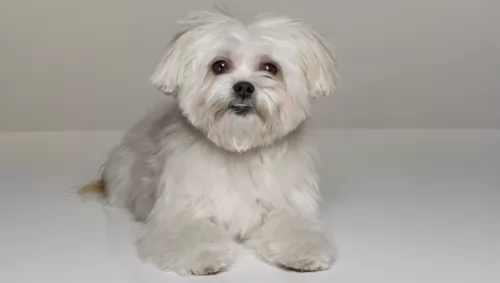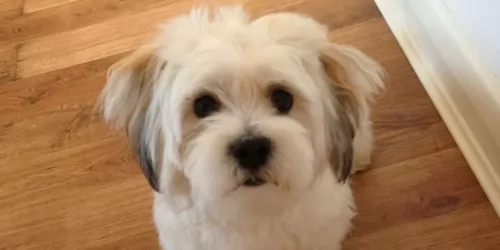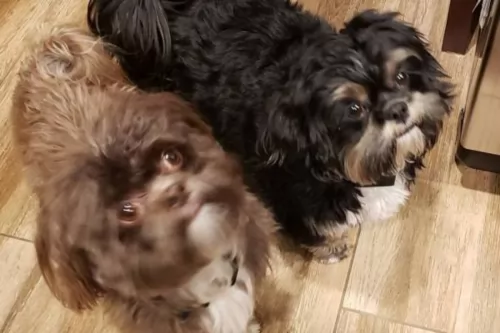 Petzlover
Petzlover Kyi-Leo is originated from United States but Lancashire Heeler is originated from United Kingdom. Both Kyi-Leo and Lancashire Heeler are having almost same height. Both Kyi-Leo and Lancashire Heeler are of same weight. Both Kyi-Leo and Lancashire Heeler has almost same life span. Kyi-Leo may have more litter size than Lancashire Heeler. Kyi-Leo requires Moderate Maintenance. But Lancashire Heeler requires Low Maintenance
Kyi-Leo is originated from United States but Lancashire Heeler is originated from United Kingdom. Both Kyi-Leo and Lancashire Heeler are having almost same height. Both Kyi-Leo and Lancashire Heeler are of same weight. Both Kyi-Leo and Lancashire Heeler has almost same life span. Kyi-Leo may have more litter size than Lancashire Heeler. Kyi-Leo requires Moderate Maintenance. But Lancashire Heeler requires Low Maintenance
 The Kyi-Leo first came about in the 1950s in San Francisco, USA, with the crossing of two dog breeds – the Lhasa Apso and the Maltese.
The Kyi-Leo first came about in the 1950s in San Francisco, USA, with the crossing of two dog breeds – the Lhasa Apso and the Maltese.
Because this is a mixed-breed dog, it isn’t recognized by the American Kennel Club, but it is recognized by some of the other dog associations such as the American Rare Breed Association or ARBA as it is known. Today the dog is looked upon as a designer breed.
 The Lancashire Heeler, known also as the Ormskirk Heeler or Ormskirk Terrier, hails from England and is looked upon as a vulnerable breed by the Kennel Club in the 21st century.
The Lancashire Heeler, known also as the Ormskirk Heeler or Ormskirk Terrier, hails from England and is looked upon as a vulnerable breed by the Kennel Club in the 21st century.
He was developed to be a cattle drover, but is essentially a companion dog today. Exact details of the origin of the Lancashire are unknown, but it is generally accepted that Welsh Corgis were used as well as a kind of black and tan terrier known as the Manchester Terrier.
In England, he has been known as a general working dog for more than a century.Gwen Mackintosh began breeding these dogs in the 1960s and the Lancashire Heeler Club was established in 1978. The dog was also placed on the Endangered Breeds in 2003.
 The Kyi-Leo is a small dog standing at 20 – 30cm in height and weighing in the region of 4 – 6kg.
The Kyi-Leo is a small dog standing at 20 – 30cm in height and weighing in the region of 4 – 6kg.
He has a long, silky coat which is essentially black and white or grey/silver and white or even gold and white. He has frail legs which can become injured or broken in vigorous rough and tumble games.
You can certainly describe the Kyi-Leo as a sweet, quiet, non-aggessive playful dog, and for anyone who wants a splendid pet and companion, this dog makes a great family pet and he won’t cost you an arm and a leg to feed either.
He also has an acute sense of hearing and this turns him into an excellent ‘alarm’ watch-dog. It is also a dog, that while he will love to join you on a walk, he isn’t a dog that is going to demand a lot of exercise.
He responds well to his human family, is easy-going and gentle, tending to be cautious around strangers. You can trust him to be an awesome playmate for children. In this instance, it’s the children who should be warned when playing with a dog like this as, because of his fragile build, he could easily be injured by children who haven’t been taught to respect animals.
Even though he is such an amicable pet, it will still be of benefit to you and him to have him trained and socialized. Then he responds well to basic commands such as sit, stay and lie-down.
Dogs who spend time with their family, pick up on the ‘culture’ of the family and they learn how to behave. Dogs who are left on their own and never socialized can become nervous and aggressive towards people as they never got to learn how to behave – they weren’t socialized.
 As a small breed dog, the Lancashire Heeler stands at 25 – 31cm in height, both male and female, and the dog weighs in the region of 2 to 6kg.
As a small breed dog, the Lancashire Heeler stands at 25 – 31cm in height, both male and female, and the dog weighs in the region of 2 to 6kg.
Looking quite similar to a Corgi or a German Shepherd with short legs, the Heeler’s legs are meant to be fairly straight and not bandy-legged. He has a short, weather-proof coarse coat that can be black or liver-colored, with tan markings. The coat is regarded as low maintenance. The hair is slightly longer around his neck.
The ears are erect, the eyes brown and bright and the tail these days is left long with a slight curl.
Intelligent, stubborn, strong willed, playful and friendly, the Lancashire Heeler is capable of making you an excellent pet and companion.
This dog is smart and learns quickly. He is energetic and playful, strong and robust and more than willing to take part in all the activities that you’re taking part in.
With training and socialization he makes a splendid pet, but he doesn’t put up well to abuse and disrespect from younger children. He is willing to get along with other pets in the home too.
 The Kyi-Leo is everything you want in a family companion – active, playful, loving, gentle, happy and balanced.
The Kyi-Leo is everything you want in a family companion – active, playful, loving, gentle, happy and balanced.
He loves his human family but tends to be a little bit wary around strangers, gradually warming to them.
He may be small, but he is robust and alert, and he is also capable of making you a good watchdog.
The Kyi-Leo is an all-round great little pet to have.
 As with any dog breed, there are wide variations in temperament. A dog essentially turns out the way it was brought up, similar to a child. Angry, harsh, aggressive, uncaring dog owners produce a dog that is both timid and aggressive, unsure, frustrated and with behavioral problems.
As with any dog breed, there are wide variations in temperament. A dog essentially turns out the way it was brought up, similar to a child. Angry, harsh, aggressive, uncaring dog owners produce a dog that is both timid and aggressive, unsure, frustrated and with behavioral problems.
Make your dog part of your family, provide him with good food, exercise and love and he will make an awesome pet.
The Lancashire Heeler is such an amicable, social dog at heart, and treated well, he will turn out like is inherent characteristics. He is an outgoing, friendly dog, more so when he has been trained and socialized. He will adapt to city- or country life, so long as he is exercised each day.
The Heeler has a good, balanced temperament, and counted in as a loved family member, you’ll make sure he stays that way.
 Your Kyi-Leo is such a feisty, robust little dog who is not likely to cost you much in terms of health care. With his frail legs, it is a good thing to know that you need to be careful with him in terms of back-and joint problems.
Your Kyi-Leo is such a feisty, robust little dog who is not likely to cost you much in terms of health care. With his frail legs, it is a good thing to know that you need to be careful with him in terms of back-and joint problems.
There are actually knee joint issues which are fairly common in small dogs, one of which is patellar luxation.
This is where the kneecap pops out of the thighbone, causing the dog to skip or hop. Some joint issues are genetic and may require surgery. Make sure to keep your pet’s weight under control to remove additional stress on the joints.
This is another dog illness you want to be careful with. Acute pancreatitis -inflammation - is when the condition comes on suddenly while chronic pancreatitis is when pancreatitis occurs over a period of time.
With acute pancreatitis in dogs you’ll see symptoms such as vomiting, abdominal pain, tremors and reluctance to eat. Pancreatitis can be brought on by too much fat, especially rancid fat, some anti-biotics, a low protein diet or a sickness such as diabetes.
If you suspect pancreatitis in your dog, get him as quickly as possible to the vet.
 Your Heeler can live to be 14, 15 or 16 years of age and live even longer than this with the right care. He is such a healthy breed, but one of the common dog illnesses to look out for are eye diseases.
Your Heeler can live to be 14, 15 or 16 years of age and live even longer than this with the right care. He is such a healthy breed, but one of the common dog illnesses to look out for are eye diseases.
This is where the ligaments of the eye are weakened so that the lens actually loosened and then displaced, causing pain for the dog. This displacement can obstruct fluid drainage from the eye too and your vet may need to perform surgery.
The shock-absorbing intervertebral discs can have spinal compression and contribute to significant pain for your pet. Early signs will see your Lancashire Heeler being reluctant to jump on his chair like he may once have done. Preventing obesity is important for reducing pressure on the dog’s spine.
 The Kyi-Leo doesn’t require vigorous exercising. One walk a day will keep them happy. There are pet owners who believe dogs can be permanently outside dogs where they can do their own exercise.
The Kyi-Leo doesn’t require vigorous exercising. One walk a day will keep them happy. There are pet owners who believe dogs can be permanently outside dogs where they can do their own exercise.
Everybody who knows dogs, knows they are social creatures who will simply lie at your backdoor just waiting for some response from their beloved human family. Every dog, regardless of breed or size, needs exercise and interaction with their humans every day.
Dogs left alone in the yard day after day are loney, frustrated and bored, and when they start digging or barking, irresponsible owners will ill treat them. These kind of people should never own a dog.
The Kyi-Leo has a sensitive stomach so he’ll need good quality food to avoid digestive problems. Ideally home-cooked food such as softly boiled chicken, brown rice and raw or cooked vegetables added into top quality kibble is the preferred diet.
Fresh, cool water needs to be constantly available.
Brush the long, silky coat at least twice a week to ensure it remains free of knotting. Brushing keeps the coat shiny too.
As a long eared dog, ears should be checked and cleaned regularly too. Air doesn’t reach the inside of their ears and the warm dampness in the ears are a breeding place for infection.
Nails should also be trimmed when they become long because left uncut they can hook onto things causing injury ad pain.
Small dogs are more prone to tartar formation and loss of teeth. You’ll notice that something isn’t right because your lively little dog will be lethargic, he may not want to eat his food and his face may be swollen. When you suspect dental problems, get him to the vet.
 Known as a low maintenance dog, the Lancashire Heeler’s short coat will require little grooming, just a good brush twice a week.
Known as a low maintenance dog, the Lancashire Heeler’s short coat will require little grooming, just a good brush twice a week.
If your Heeler doesn’t wear his nails down naturally, they will need to be clipped as part of the grooming process. Ears should also be checked regularly. Excess wax and dirt can build up which can lead to an ear infection. This can drive your dog mad with frustration. Teeth also need to be brushed regularly.
Remember, if you feel guilty for not getting to grooming your pet, there are professional groomers at your local vet or who work independently and they will do all of this for you.
Your Lancashire Heeler is such a social, active little dog who is always willing to be counted in to all your fun and games. If you’re lucky to have a fair sized garden, involve him in some ball games, or use a rope for him to tug on while you pull the other side. Whenever you go for a walk, he will be thrilled to join you as he loves picking up all those new scents outside his garden.
Nutritious food is important for longevity and health in a dog. Every dog has different dietary needs throughout their lives – when they’re puppies, when the female is pregnant, after they’ve been spayed or neutered, as a working dog, when they’re sick, when they’re old and so on.
There are some good dog brand foods to use, but you want to choose the best ones to ensure your dog gets all the vitamins and minerals needed as opposed to those that are packed with colorants, preservatives and fillers.
Home-made food is important too and some cooked chicken, cooked rice and raw or cooked vegetables can be added to his dry kibble from time to time. Don’t complicate your dog’s diet – just feed him plain, wholesome food like this with a little bit of raw meat added in occasionally. Simple, nutritious food will ensure he is energetic, bright eyed and happy. Make sure he always has fresh, cool water.